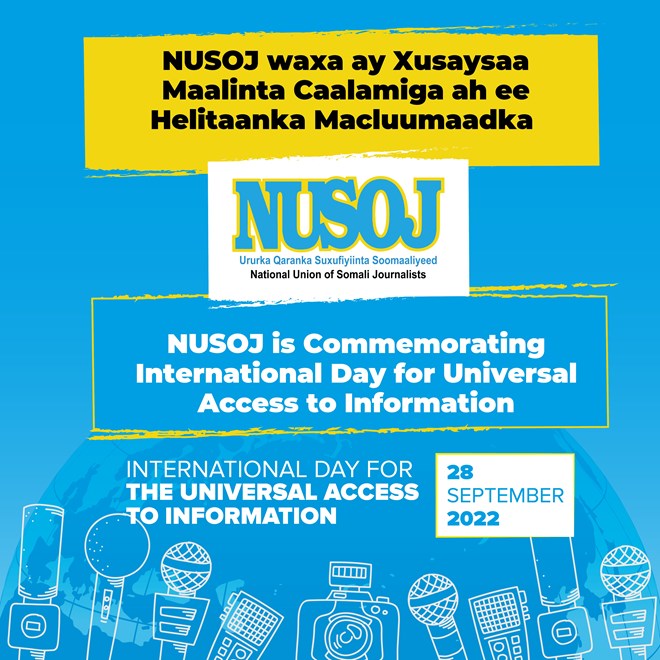
Thursday September 29, 2022
Commemorating this year’s International Day for Universal Access to Information

The National Union of Somali Journalists (NUSOJ) joins the world in commemorating the International Day for Universal Access to Information. This year’s theme, “Artificial Intelligence, e-Governance and Access to Information”, aptly encourages journalists and citizens at large to reflect on the consistently dynamic and fast-paced information ecosystem that has digital technology at its heart.
Somalia just not find itself unable to keep up with these developments. Making access to information is a human right for all, particularly those on the margins of society who must be brought into the digital fold in order to make informed personal, social, economic and political decisions.
This international day offers Somali people including media practitioners the opportunity to not simply call for access to information but warrants a more nuanced call, one that questions the type of information to be accessed and the accessibility of information platforms for all Somalis.
Currently, Somalia’s governance processes, both at Federal and State levels, are haphazard and not streamlined. High levels of corruption plague not only national performance but make a mockery of the principles and tenets outlined in the constitution. At the core of this is the underwhelming experience of the Somali citizen who has little belief in the system. The development of e-government has the potential to improve delivery of public services, improve public/private partnerships, increase access to information that could empower citizens and challenge the culture of secrecy that has plagued Somali institutions for too long.
“In short, e-governance can result in more effective governance and government accountability,” says NUSOJ General Secretary, Omar Faruk Osman. “The positive, knock-on effect of this multiple and layered but can no doubt result in better economic performance at a national level, higher levels of health and well-being, and sustained peace and security.”
Evidence on the power of Artificial intelligence (AI) is slowly coming to the fore and highlights that people’s various devices can learn from experience, adjust to the various inputs people make to it and perform tasks that would improve efficiency and effectiveness. While Somalia may be in its infancy in some of these more advanced digital developments, it remains important that Somalis attempt to stay on the cusp of new knowledge and advocate for better discussion and participation on how they can impact Somali society.
The positives as well as the cautions must be acknowledged. Because Artificial Intelligence uses citizen data, the issue of data privacy is a critical one. The principles and ethics upon which decisions around AI are made must be determined through consultative processes that include all relevant groups in Somalia.
Alongside these digital developments, NUSOJ continues to call for a more enabling environment with regards to access to information. Whilst the Provisional Constitution of Somalia came into force in 2012 and made provisions for an Access to Information Law, this has not materialised. This remains inexcusable.
NUSOJ therefore calls on the Federal Government of Somalia to cease their delay in enacting the long-overdue Access to Information law. There are innumerable examples and frameworks from which Somalia can take lessons, not least the comprehensive African Union Model Law of Access to Information developed by African Commission on Human and Peoples’ Rights (ACHPR).
“Once an Access to Information law is enacted and effectively implemented, it holds great potential for fostering good governance by improving management of information, use of public resources, while at the same time laying bare any maladministration taking place,” says Osman.
Without legislation to enforce a constitutional right to information, Somalis continued to be denied this fundamental human right, a right which is appropriately seen as a gateway to other rights. The Sustainable Development Goal (SDG) 16, Target 10 speaks to “Ensuring Public Access to Information and Protect Fundamental Freedoms”. Without the realisation of this goal, Somalia cannot hope to progress towards or achieve other SDGs.
In a similar vein, the impressive and ambitious tenets of Somalia’s National Development Plan 9 cannot be achieved if citizens don’t have access to information in regards to their social and economic rights and the government’s obligations to the same. Somalia’s development can only be achieved if citizens participate fully in their own development, and to do this they must have access to what has been intended and be shown how it compares to the current realities; they must have access to the visions, strategies and programmes of the government.
This is fundamental if public officials are to be held accountable for their constitutional obligations. Only through this level of transparency can a true relationship between the Somali government and the Somali people develop and be sustained.